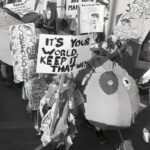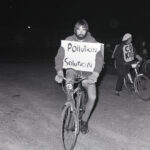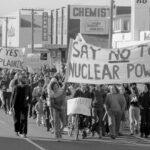Manawatu Exhibition: Environment
Our priceless natural heritage
By the late 1960s, there was growing awareness that human activity was inflicting significant damage on the natural environment, and the pace was accelerating in the name of ‘progress’. Prevailing beliefs – that nature was a resource to be exploited for human development, rivers should be dammed to generate electricity and native bush should be felled for timber or cleared to enable mining or pastoral farming – began to be questioned.
Manawatu Photographs
Showing an interest which continues with secondary school students 50 years later, 3rd form (year 9) students from Feilding Agricultural High School march through Feilding demonstrating against litter polluting the environment as part of Conservation Week in 1972. They formed a “12-foot long green bug.” Hazel Nash (with long hair) is at the center of the photo. Fifty-two years on, we ruefully reflect that we didn’t listen hard enough.
Sharing the front page with the high school students during Conservation Week in 1972, forty cyclists biked around the Square several times in a demonstration against the pollution caused by cars. Since then, cycle helmets have been made compulsory and car numbers have risen threefold
Young families predominated at the march against the introduction of nuclear ships and nuclear power to New Zealand. Massey scientist Dr Pauline Penny, whose work involved radioactive materials, spoke on the dangers — not of nuclear power itself, but of what could happen with misuse of its by-products. Social Credit’s local candidates Les Hunter and Peter Edmonds were prepared to agree that we didn’t want ships with nuclear weapons, but they argued that nuclear power was the way of the future, and to oppose its use was ridiculous. They believed by-products could be beneficially used in medicine, transport and health. Striding along at the front of the march, hands in pockets, is legendary trade unionist Alan Millar. Born in Scotland in 1938, Alan ran away to sea in his teens. In 1956 he jumped ship in Auckland and later came to Palmerston North with a massive social conscience, a sense of humor, insightfulness and the ability to quote from Dickens at will. As regional secretary of the PSA for many years he tirelessly brought attention to inequality and unfairness. He died in February 2024, and is remembered with love and respect.


